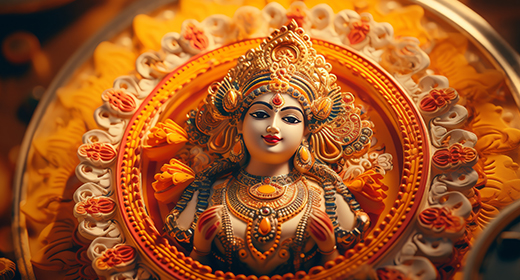11 MAJOR RULES [LAW] OF KARMA
- Karma is the beginning of Creation
- Karma makes Destiny
- Karma cannot be skipped
- Karma has a definite result
- Karma is a way to Moksha
- Karma is way of practical knowledge
- Karma is applied to all equally
- Karma gives Results based on Situations
- Karma can be affected by the mind
- Karma can be boosted by Love, Devotion, Meditation and Creativity
- God can not interfere on Karma
QUESTIONS AND ANSWERS ON KARMA
-
How do I get rid of bad karma in my life? [asked by: Giovanna Imprezzabile]
Answer: Understand this with an example, in our childhood, sometimes we did some small mistakes and we got scared of our mother. After some time our mother came and gave us some punishment accordingly. If we did something that could not be improved, we got a big punishment but if something small happened we just got a few minutes of scolding. The same happens in our life some mistakes cannot be recovered but there are some mistakes that can be improved with spiritual practices.
-
What are Bad Karma and Good Karma? [asked by: Giovanna Imprezzabile]
Answer: Any karma that is performed with good intentions for someone's help is good karma. Any karma that is performed with bad intentions is bad karma. Karma is not only for humans; it also applies to animals, that's why when we feed animals, we get good karma. Also, it is not always for others, it is for yourself too, that's why if someone commits suicide, it is bad karma because he (the mind) hurts himself (the body).
-
How much intense are the results of Good Karma and Bad Karma? [asked by: Rutuja Nakate]
Answer: The results of good karma or bad karma always come on time and the time is set by God. So all the good karma results are so intense and they will definitely help you. The results can give a lot of knowledge in life. The bad karma results are also so intense because when they come, it means God wants you to realize something, and after that dark time, there is a beautiful morning ahead.
-
How to understand the difference between good Karma and bad karma? [asked by: Naynika Tarika]
Answer: Once a human starts the spiritual practice, he/she will get awareness. When the awareness comes, you can easily understand the intention behind any Karma. To judge people is not necessary or easy but the awareness will be starts from your own body, mind, and soul.

KARMA IS THE BEGINNING OF CREATION
There is no creation without the Karmic Circle. Whatever happened, is happening, or will happen has a meaning based on Karma. The Karma we did in our past or previous life is stored and ready to come at the right time. Whatever happens without any effort is set by the rules of nature. Whatever else a human is doing, he follows the rules of Karma. A human is his own creator of Karma. He can choose to do right or wrong Karma. But the results are not in a human's hands.
Lord Krishna in Srimad Bhagvada Geeta explained about Karma:
कर्मण्येवाधिकारस्ते मा फलेषु कदाचन ।
मा कर्मफलहेतुर्भुर्मा ते संगोऽस्त्वकर्मणि ॥ Chapter 02, Verse 47
Karmanye Vadhikaraste Ma Phaleshu Kada Chana,
Ma Karma Phala Hetur Bhurma te Sangostva Akarmani. (2.47)
Meaning: You have a right to perform your Karma, but you are not the decider or entitled to the results of the action. Never consider yourself to be the cause of the results, and never be attached to not doing your Karma.

KARMA MAKES DESTINY
Karma makes destiny. This truth is mentioned in many books as well as explained by many Gurus and monks. Destiny is the storage of Karma or the results of Karma. Destiny is something that is decided by how you perform Karma. Bad action or Karma makes bad destiny, and good deeds or Karma make good destiny. Like the above image which shows a circle of the moon every month, destiny is the same, someday it will show you the bright moon means the good days, and at other times it may show you dark moon means painful days. So a yogi should not react to the bad or good. He should be calm and peaceful in all situations.
Lord Krishna in Srimad Bhagvada Geeta explained about Yogi's behavior:
यो न हृष्यति न द्वेष्टि न शोचति न काङ् क्षति |
शुभाशुभपरित्यागी भक्तिमान्य: स मे प्रिय: ॥ Chapter 12, Verse 17
Yo na hrishyati na dveshti na shochati na kankshati,
Shubhashubha-parityagi bhaktiman yah sa me priyah. (12.17)
Meaning: Those who neither rejoice in pleasures nor despair in worldly sorrows, who are neither sad for any loss nor greedy for any gain, who renounce and become happy in both good and evil deeds, such people, who are full of devotion, are very dear to Me.

KARMA CAN NOT BE SKIPPED
Karma is the responsibility of every human. No one can skip the Karma. Sometimes we may be sad due to the lack of positive results in life, but nature gives us motivation again to do Karma and we continue. Disappointments with results cannot permanently stop the doer. Even if a human is not doing anything productive or creative, the Karmic Circle will keep going and motivate him again to do Karma. A human who plants a mango tree at the age of 80 is well aware that he will not be available in the future to eat the mangoes, but he does it for the children or grandchildren ahead.
Lord Krishna in Srimad Bhagvada Geeta explained about Karma:
न हि कश्चित्क्षणमपि जातु तिष्ठत्यकर्मकृत् ।
कार्यते ह्यवशः कर्म सर्वः प्रकृतिजैर्गुणैः ॥ Chapter 03, Verse 05
Na hi kasichiatksanamapi jatu tisthatyakarmakrt,
Karyate hyavasah karma sarvah prakrtijairgunaih. (03.05)
Meaning: A human cannot be free from doing Karma because nature and Gunas (qualities) give the compulsion and pressure to do Karma.

KARMA HAS A DEFINITE RESULT
Karma definitely gives a result, but the time is not in our hands. We can do only Karma, but cannot decide the time of results. Doing Karma is like throwing a stone that will definitely fall somewhere because of nature's rules. Once you have already thrown that stone, you can only wait for results.
Lord Krishna in Srimad Bhagvada Geeta explained about Gyaan Yog & Karma Yoga:
न कर्मणामनारम्भान्नैष्कर्म्यं पुरुषोऽश्नुते।
न च संन्यसनादेव सिद्धिं समधिगच्छति॥ Chapter 03, Verse 04
na karmanam anarambhan naishkarmyam purusho ’shnute,
na cha sannyasanad eva siddhim samadhigachchhati. (03.04)
Meaning: One neither attains Siddhi by renunciation of actions nor achieves self-realization without doing actions.

KARMA IS A WAY TO MOKSHA
Karma is also a way to liberation. The Liberation from the circle of life and death is called "Moksha". Once a human has finished all pending Karma and has started all Karma with devotion as he would do for God, in this way, he reaches the door of Moksha.
Lord Krishna in Srimad Bhagvada Geeta explained about the importance of Karma:
नियतं कुरु कर्म त्वं कर्म ज्यायो ह्यकर्मणः।
शरीरयात्रापि च ते न प्रसिद्ध्येदकर्मणः॥ Chapter 03, Verse 08
niyatam kuru karma tvam karma jyayo hyakarmanah,
sharira-yatrapi cha te na prasiddhyed akarmanah. (03.08)
Meaning: Just do Karma (your duties and deeds) continuously because it is better to do Karma than not do any. When you don't do Karma, there is no meaning in your life and even your sustenance will not be perfect.

KARMA IS WAY OF PRACTICAL KNOWLEDGE
Practical knowledge cannot come from books or watching TV or a Phone. It can come only by doing Karma practically. Every time a human wins or fails, he definitely gets some practical knowledge from that Karma.

KARMA IS APPLIED TO ALL EQUALLY
From a poor person to a rich person, Karma is applied to all equally. The mechanism of Karma is a balanced system that applies to all in a balanced way. God does not make any difference while giving the results of Karma. If sometimes you feel any difference, it's because of intentions.
Lord Krishna in Srimad Bhagvada Geeta explained to do Karma:
न मे पार्थास्ति कर्तव्यं त्रिषु लोकेषु किञ्चन।
नानवाप्तमवाप्तव्यं वर्त एव च कर्मणि॥ Chapter 03, Verse 22
na me pārthāsti kartavyaṁ triṣu lokeṣu kiṁcana,
nānavāptamavāptavyaṁ varta eva ca karmaṇi. (03.22)
Meaning: Sri Krishna said to Arjuna, "O Parth (Son of Pritha), I neither have any work to do in all the three worlds, I have gained everything, and now there is nothing left to gain, but still, I abide verily in the path of Karma.

KARMA GIVES RESULTS BASED ON SITUATIONS
God always seeks the best time to give results. It always opens a door when all others get closed. God does not give results when you want them, but when you need them.
Lord Krishna in Srimad Bhagvada Geeta explained about the divine result of Karma:
तस्मादसक्तः सततं कार्यं कर्म समाचर।
असक्तो ह्याचरन्कर्म परमाप्नोति पूरुषः॥ Chapter 03, Verse 19
tasmad asaktah satatam karyam karma samachara,
asakto hyacharan karma param apnoti purushah. (03.19)
Meaning: Give up the attachment of result and perform Karma as a duty. By doing so, you will attain the Supreme.

KARMA CAN BE AFFECTED BY THE MIND
The mind plays an important role in Karma because when the intention comes from the soul, humans get motivated to do Karma, but the mind makes it good or bad based on past memories or experiences.
Lord Krishna in Srimad Bhagvada Geeta explained about Gyaan Yog & Karma Yoga:
लोकेऽस्मिन्द्विविधा निष्ठा पुरा प्रोक्ता मयानघ।
ज्ञानयोगेन सांख्यानां कर्मयोगेन योगिनाम्॥ Chapter 03, Verse 03
loke ’smin dvi-vidha nishtha pura prokta mayanagha
jnana-yogena sankhyanam karma-yogena yoginam. (03.03)
Meaning: O sinless Arjuna, there is a twofold path in this world as mentioned by me: the path of knowledge of the Sankhyas and the path of action of the Yogis.
Lord Krishna in Srimad Bhagvada Geeta explained about Karma:
इन्द्रियाणि पराण्याहुरिन्द्रियेभ्यः परं मनः।
मनसस्तु परा बुद्धिर्यो बुद्धेः परतस्तु सः॥ Chapter 03, Verse 42<
indriyani paranyahur indriyebhyah param manah
manasas tu para buddhir yo buddheh paratas tu sah. (03.42)
Meaning: The senses are superior to the body, the mind is superior to the senses, and that which is superior to the mind is the soul.

KARMA CAN BE BOOSTED BY LOVE, DEVOTION, MEDITATION AND CREATIVITY
In Gita, Lord Krishna mentioned that if someone does Karma for God, it will always give better results. This simply means that you have to pack your Karma with love, kindness, and devotion, and do it like you are doing everything for God. Your Karma should be logged with devotion from your pure heart. Doing meditation for better focus and concentration, and being in the present moment, and doing the Karma with creativity also helps to achieve higher goals and better results.

GOD CAN NOT INTERFERE ON KARMA
God does not need to interfere in Karma. God is like an observer of our mind, body, and soul. God does not react when someone does bad or good Karma, but if someone has devotion for God, some indications come in life that can inspire and guide one to do well.
Lord Krishna in Srimad Bhagvada Geeta explained about Karma and God:
यज्ञार्थात्कर्मणोऽन्यत्र लोकोऽयं कर्मबन्धन:।
तदर्थं कर्म कौन्तेय मुक्तसङ्ग: समाचर।। Chapter 03, Verse 09
yajñārthāt karmaṇo 'nyatra loko 'yaṁ karma-bandhanaḥ
tad-arthaṁ karma kaunteya mukta-saṅgaḥ samāchara. (03.09)
Meaning: Karma is done as a Yajna to the Supreme Lord. If not done in this way, then it will create a bondage in this world. So, O son of Kunti, you keep doing your Karma for the satisfaction of God without being attached to the results.





